- Home
- Gillian Flynn
Gone Girl: A Novel Page 15
Gone Girl: A Novel Read online
Page 15
Before we were done, Boney interrupted. “I understand, guys, it’s natural to want to feel involved. But what you did was dangerous. You have got to let us handle this kind of thing.”
“That’s just it, though, you aren’t handling it,” I said. “You’d never have gotten this information, about the gun, if we didn’t go out there last night. What did Lonnie say when you talked to him?”
“Same thing you said he said,” Gilpin said. “Amy wanted to buy a gun, she was scared.”
“You don’t seem that impressed by this information,” I snapped. “Do you think he was lying?”
“We don’t think he was lying,” Boney said. “There’s no reason for the guy to invite police attention to himself. He seemed very struck by your wife. Very … I don’t know, rattled that this had happened to her. He remembered specific details. Nick, he said she was wearing a green scarf that day. You know, not a winter scarf but a fashion-statement scarf.” She made fluttery moves with her fingers to show she thought fashion to be childish, unworthy of her attention. “Emerald green. Ring a bell?”
I nodded. “She has one she wears with blue jeans a lot.”
“And a pin on her jacket—a gold cursive A?”
“Yes.”
Boney shrugged: Well, that settles it.
“You don’t think he might have been so struck by her that he … kidnapped her?” I asked.
“He has an alibi. Rock-solid,” Boney said, giving me a pointed look. “To tell the truth, we’ve begun to look for … a different kind of motive.”
“Something more … personal,” Gilpin added. He looked dubiously at his pancakes, topped with strawberries and puffs of whipped cream. He began scraping them to the side of his plate.
“More personal,” I said. “So does that mean you’re finally going to talk to Desi Collings, or Hilary Handy? Or do I need to?” I had, in fact, promised Marybeth I’d go today.
“Sure, we will,” Boney said. She had the placating tone of a girl promising her pesky mom to eat better. “We doubt it’s a lead—but we’ll talk to them.”
“Well, great, thanks for doing your job, kind of,” I said. “And what about Noelle Hawthorne? If you want someone close to home, she’s right in our complex, and she seems a little obsessed with Amy.”
“I know, she’s called us, and she’s on our list.” Gilpin nodded. “Today.”
“Good. What else are you doing?”
“Nick, we’d actually like you to make some time for us, let us pick your brain a bit more,” Boney said. “Spouses often know more than they realize. We’d like you to think a bit more about the argument—that barnburner your neighbor Mrs., uh, Teverer overheard you and Amy having the night before she went missing.”
Rand’s head jerked toward me.
Jan Teverer, the Christian casserole lady who wouldn’t meet my eye anymore.
“I mean, could it have been because—I know this is hard to hear, Mr. Elliott—because Amy was under the influence of something?” Boney asked. Innocent eyes. “I mean, maybe she has had contact with less savory elements in town. There are plenty of other drug dealers. Maybe she got in over her head, and that’s why she wanted a gun. There’s got to be a reason she wants a gun for protection and doesn’t tell her husband. And Nick, we’d like you to think harder about where you were between that time—the time of the argument, about eleven P.M., the last anyone heard Amy’s voice—”
“Besides me.”
“Besides you—and noon, when you arrived at your bar. If you were out and about in this town, driving to the beach, hanging around the dock area, someone must have seen you. Even if it was someone just, you know, walking his dog. If you can help us, I think that would be really …”
“Helpful,” Gilpin finished. He speared a strawberry.
They both watched me attentively, congenially. “It’d be super-helpful, Nick,” Gilpin repeated more pleasantly. First time I’d heard about the argument—that they knew about it—and they chose to tell me in front of Rand—and they chose to pretend it wasn’t a gotcha.
“Sure thing,” I said.
“You mind telling us what it was about?” Boney asked. “The argument?”
“What did Mrs. Teverer tell you it was about?”
“I hate to take her word when I got you right here.” She poured some cream into her coffee.
“It was such a nothing argument,” I began. “That’s why I never mentioned it. Just both of us scrapping at each other, the way couples do sometimes.”
Rand looked at me as if he had no clue what I was talking about: Scrapping? What is this scrapping of which you speak?
“It was just—about dinner,” I lied. “About what we’d do for dinner for our anniversary. You know, Amy is a traditionalist about these things—”
“The lobster!” Rand interrupted. He turned to the cops. “Amy cooks lobster every year for Nick.”
“Right. But there’s nowhere to get lobster in this town, not alive, from the tank, so she was frustrated. I had the Houston’s reservation—”
“I thought you said you didn’t have a Houston’s reservation.” Rand frowned.
“Well, yes, sorry, I’m getting confused. I just had the idea of the Houston’s reservation. But I really should have just arranged to have some lobster flown in.”
The cops, each of them, raised an accidental eyebrow. How very fancy.
“It’s not that expensive to do. Anyway, we were at this rotten loggerheads, and it was one of those arguments that got bigger than it should have.” I took a bite of my pancakes. I could feel the heat rushing from under my collar. “We were laughing about it within the hour.”
“Hunh” was all Boney said.
“And where are you on the treasure hunt?” Gilpin asked.
I stood up, put down some money, ready to go. I wasn’t the one who was supposed to be playing defense here. “Nowhere, not right yet—it’s hard to think clearly with so much going on.”
“Okay,” Gilpin said. “It’s less likely the treasure hunt is an angle, now that we know she was already feeling threatened months ago. But keep me in the loop anyway, okay?”
We all shuffled out into the heat. As Rand and I got into our car, Boney called out, “Hey, is Amy still a two, Nick?”
I frowned at her.
“A size two?” she repeated.
“Yes, she is, I think,” I said. “Yes. She is.”
Boney made a face that said Hmmmm, and got in her car.
“What do you think that was about?” Rand asked.
“Those two, who knows?”
We remained silent for most of the way to the hotel, Rand staring out the window at the rows of fast-food restaurants blinking by, me thinking about my lie—my lies. We had to circle to find a space at the Days Inn; the payroll convention was apparently a hot ticket.
“You know, it’s funny, how provincial I am, lifetime New Yorker,” Rand said, fingers on the door handle. “When Amy talked about moving back here, back along the Ole Mississippi River, with you, I pictured … green, farmland, apple trees, and those great old red barns. I have to tell you, it’s really quite ugly here.” He laughed. “I can’t think of a single thing of beauty in this whole town. Except for my daughter.”
He got out and strode quickly toward the hotel, and I didn’t try to catch up. I entered the headquarters a few minutes behind him, took a seat at a secluded table toward the back of the room. I needed to complete the treasure hunt before the clues disappeared, figure out where Amy had been taking me. After a few hours’ stint here, I’d deal with the third clue. In the meantime, I dialed.
“Yeah,” came an impatient voice. A baby was crying in the background. I could hear the woman blow the hair off her face.
“Hi, is this—is this Hilary Handy?”
She hung up. I phoned back.
“Hello?”
“Hi there. I think we got cut off before.”
“Would you put this number on your do not call list—”
Silence. The baby squawked again, a mewl that wavered dangerously between laughter and tantrum.
“What about her?”
“I don’t know if you’ve seen this on TV, but she’s gone missing. She went missing on July fifth under potentially violent circumstances.”
“Oh. I’m sorry.”
“I’m Nick Dunne, her husband. I’ve just been calling old friends of hers.”
“Oh yeah?”
“I wondered if you’d had any contact with her. Recently.”
She breathed into the phone, three deep breaths. “Is this because of that, that bullshit back in high school?” Farther in the background, a child’s wheedling voice yelled out, “Moo-oom, I nee-eed you.”
“In a minute, Jack,” she called into the void behind her. Then returned to me with a bright red voice: “Is it? Is that why you’re calling me? Because that was twenty goddamn years ago. More.”
“I know. I know. Look, I have to ask. I’d be an asshole not to ask.”
“Jesus fucking Christ. I’m a mother of three kids now. I haven’t talked to Amy since high school. I learned my lesson. If I saw her on the street, I’d run the other way.” The baby howled. “I gotta go.”
“Just real quick, Hilary—”
She hung up, and immediately, my disposable vibrated. I ignored it. I had to find a place to stow the damn thing.
I could feel the presence of someone, a woman, near me, but I didn’t look up, hoping she would go away.
“It’s not even noon, and you already look like you’ve had a full day, poor baby.”
Shawna Kelly. She had her hair pulled up in a high bubblegum-girl ponytail. She aimed glossed lips at me in a sympathetic pout. “You ready for some of my Frito pie?” She was bearing a casserole dish, holding it just below her breasts, the saran wrap dappled with sweat. She said the words like she was the star of some ’80s hair-rock video: You want summa my pie?
“Big breakfast. Thanks, though. That’s really kind of you.”
Instead of going away, she sat down. Under a turquoise tennis skirt, her legs were lotioned so well they reflected. She kicked me with the toe of an unblemished Tretorn. “You sleeping, sweetie?”
“I’m holding up.”
“You’ve got to sleep, Nick. You’re no good to anyone if you’re exhausted.”
“I might leave in a little bit, see if I can grab a few hours.”
“I think you should. I really do.”
I felt a sudden keen gratitude to her. It was my mama’s-boy attitude, rising up. Dangerous. Crush it, Nick.
I waited for her to go. She needed to go—people were beginning to watch us.
“If you want, I can drive you home right now,” she said. “A nap might be just the thing for you.”
She reached out to touch my knee, and I felt a burst of rage that she didn’t realize she needed to go. Leave the casserole, you clingy groupie whore, and go. Daddy’s-boy attitude, rising up. Just as bad.
“Why don’t you check in with Marybeth?” I said brusquely, and pointed to my mother-in-law by the Xerox, making endless copies of Amy’s photo.
“Okay.” She lingered, so I began ignoring her outright. “I’ll leave you to it, then. Hope you like the pie.”
The dismissal had stung her, I could tell, because she made no eye contact as she left, just turned and sauntered off. I felt bad, debated apologizing, making nice. Do not go after that woman, I ordered myself.
“Any news?” It was Noelle Hawthorne, entering the same space Shawna had just vacated. She was younger than Shawna but seemed older—a plump body with dour, wide-spaced mounds for breasts. A frown on her face.
“Not so far.”
“You sure seem to be handling it all okay.”
I twitched my head at her, unsure what to say.
“Do you even know who I am?” she asked.
“Of course. You’re Noelle Hawthorne.”
“I’m Amy’s best friend here.”
I had to remind the police: There were only two options with Noelle. She was either a lying publicity whore—she liked the cachet of being pals with a missing woman—or she was crazy. A stalker determined to befriend Amy, and when Amy shirked her …
“Do you have any information about Amy, Noelle?” I asked.
“Of course I do, Nick. She was my best friend.”
We stared each other down for a few seconds.
“Are you going to share it?” I asked.
“The police know where to find me. If they ever get around to it.”
“That’s super-helpful, Noelle. I’ll make sure they talk to you.”
Her cheeks blazed red, two expressionist splatters of color.
She went away. I thought the unkind thought, one of those that burbled up beyond my control. I thought: Women are fucking crazy. No qualifier: Not some women, not many women. Women are crazy.
Once night fell fully, I drove to my dad’s vacant house, Amy’s clue on the seat beside me.
Maybe you feel guilty for bringing me here
I must admit it felt a bit queer
But it’s not like we had the choice of many a place
We made the decision: We made this our space.
Let’s take our love to this little brown house
Gimme some goodwill, you hot lovin’ spouse!
This one was more cryptic than the others, but I was sure I had it right. Amy was conceding Carthage, finally forgiving me for moving back here. Maybe you feel guilty for bringing me here … [but] We made this our space. The little brown house was my father’s house, which was actually blue, but Amy was making another inside joke. I’d always liked our inside jokes the best—they made me feel more connected to Amy than any amount of confessional truth-telling or passionate lovemaking or talk-till-sunrising. The “little brown house” story was about my father, and Amy is the only person I’d ever told it to: that after the divorce, I saw him so seldom that I decided to think of him as a character in a storybook. He was not my actual father—who would have loved me and spent time with me—but a benevolent and vaguely important figure named Mr. Brown, who was very busy doing very important things for the United States and who (very) occasionally used me as a cover to move more easily about town. Amy got tears in her eyes when I told her this, which I hadn’t meant, I’d meant it as a kids are funny story. She told me she was my family now, that she loved me enough to make up for ten crappy fathers, and that we were now the Dunnes, the two of us. And then she whispered in my ear, “I do have an assignment you might be good for …”
As for bringing back the goodwill, that was another conciliation. After my father was completely lost to the Alzheimer’s, we decided to sell his place, so Amy and I went through his house, putting together boxes for Goodwill. Amy, of course, was a whirling dervish of doing—pack, store, toss—while I sifted through my father’s things glacially. For me, everything was a clue. A mug with deeper coffee stains than the others must be his favorite. Was it a gift? Who gave it to him? Or did he buy it himself? I pictured my father finding the very act of shopping emasculating. Still, an inspection of his closet revealed five pairs of shoes, shiny new, still in their boxes. Had he bought these himself, picturing a different, more social Bill Dunne than the one slowly unspooling alone? Did he go to Shoe-Be-Doo-Be, get my mother to help him, just another in a long line of her casual kindnesses? Of course, I didn’t share any of these musings with Amy, so I’m sure I came off as the goldbricker I so often am.
“Here. A box. For Goodwill,” she said, catching me on the floor, leaning against a wall, staring at a shoe. “You put the shoes in the box. Okay?” I was embarrassed, I snarled at her, she snapped at me, and … the usual.
I should add, in Amy’s defense, that she’d asked me twice if I wanted to talk, if I was sure I wanted to do this. I sometimes leave out details like that. It’s more convenient for me. In truth, I wanted her to read
my mind so I didn’t have to stoop to the womanly art of articulation. I was sometimes as guilty of playing the figure-me-out game as Amy was. I’ve left that bit of information out too.
I’m a big fan of the lie of omission.
I pulled up in front of my dad’s house just after ten P.M. It was a tidy little place, a good starter home (or ender home). Two bedrooms, two baths, dining room, dated but decent kitchen. A for-sale sign rusted in the front yard. One year and not a bite.
I entered the stuffy house, the heat rolling over me. The budget alarm system we installed after the third break-in began beeping, like a bomb countdown. I input the code, the one that drove Amy insane because it went against every rule about codes. It was my birthday: 81577.
Code rejected. I tried again. Code rejected. A bead of sweat rolled down my back. Amy had always threatened to change the code. She said it was pointless to have one that was so guessable, but I knew the real reason. She resented that it was my birthday and not our anniversary: Once again I’d chosen me over us. My semi-sweet nostalgia for Amy disappeared. I stabbed my finger at the numbers again, growing more panicked as the alarm beeped and beeped and beeped its countdown—until it went into full intruder blare.
Woooonk-woooonk-woooonk!
My cell phone was supposed to ring so I could give the all-clear: Just me, the idiot. But it didn’t. I waited a full minute, the alarm reminding me of a torpedoed-submarine movie. The canned heat of a closed house in July shimmered over me. My shirt back was already soaked. Goddammit, Amy. I scanned the alarm for the company’s number and found nothing. I pulled over a chair and began yanking at the alarm; I had it off the wall, hanging by the cords, when my phone finally rang. A bitchy voice on the other end demanded Amy’s first pet’s name.
Woooonk-woooonk-woooonk!
It was exactly the wrong tone—smug, petulant, utterly unconcerned—and exactly the wrong question, because I didn’t know the answer, which infuriated me. No matter how many clues I solved, I’d be faced with some Amy trivia to unman me.
“Look, this is Nick Dunne, this is my dad’s house, this account was set up by me,” I snapped. “So it doesn’t really fucking matter what my wife’s first pet’s name was.”

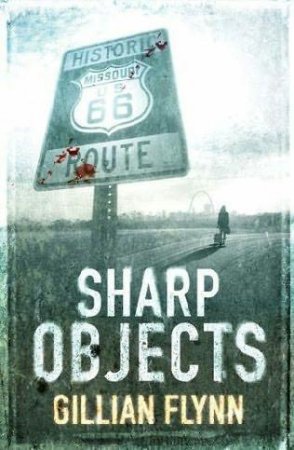 Sharp Objects
Sharp Objects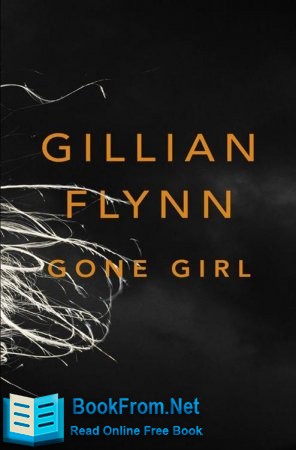 Gone Girl
Gone Girl Dark Places
Dark Places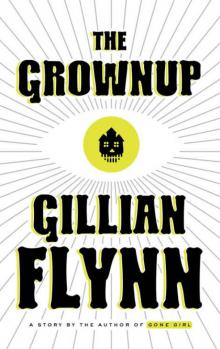 The Grownup
The Grownup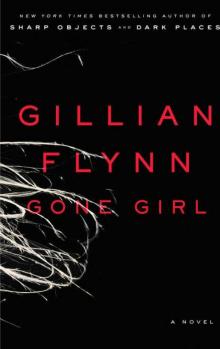 Gone Girl: A Novel
Gone Girl: A Novel The Complete Gillian Flynn
The Complete Gillian Flynn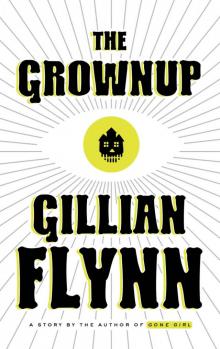 The Grownup: A Story by the Author of Gone Girl (Kindle Single)
The Grownup: A Story by the Author of Gone Girl (Kindle Single)